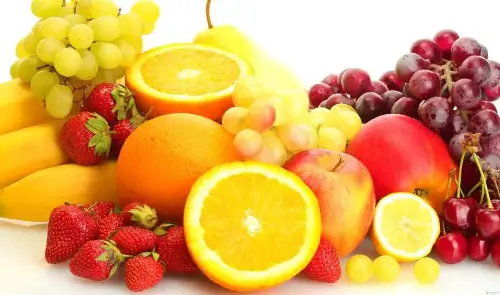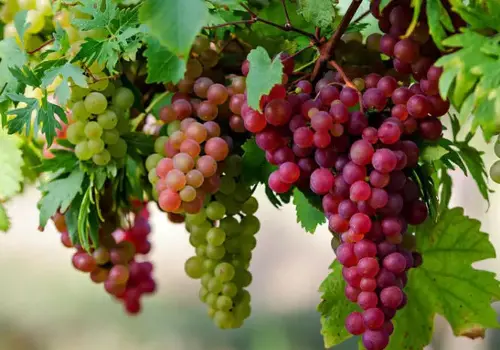Eating fruit is very good for your health, especially when you are sick because it provides many vitamins and minerals. However, when you are sick and have to take medicine, you need to know the interactions between certain fruits and medicine to avoid harm.

Some fruits in this group cause incompatibility when taking medicine - Illustration photo/internet source
Doctor Cao Hong Phuc, Military Hospital 103 said, eating fruit brings many health benefits. Fruit provides important nutrients for health and maintaining a healthy body.
Fruit is part of an overall healthy diet, eating foods like fruit that are low in calories is not only helpful in weight control, reducing the risk of heart disease, including heart attack and stroke, fighting certain types of cancer…
Fruits provide vitamins, minerals, fiber, folic acid, potassium… and many other important nutrients for the body.
Therefore, in addition to the daily diet, when sick, fruit is always the food used to nourish and strengthen health. However, there are some types of fruit that are incompatible with medicine. If we do not know, it can be life-threatening when taking medicine and eating these fruits.
Drink medicine and eat grapes easy to hospitalize
If your medication is not working, check to see if you are eating grapes while taking the medication. If so, remove grapes from your diet immediately.
Grapes contain furanocoumarin and bioflavonid which inhibit the enzyme CYP3A4. CYP3A4 is a drug metabolizing enzyme so it easily causes drugs to accumulate in the body and cause poisoning.
The risk of grapes interacting with drugs can come from drinking grape juice or eating any part of the grape (skin, pulp, seeds).
To date, it is estimated that there are about 83 drugs that interact with grapes, and of these, about 43 cause extremely serious interactions. Typical drug groups include the following:
– Blood pressure medication: The blood pressure medications at the center of this conflict are calcium channel blockers such as nifedipine and verapamil. These two drugs work by blocking calcium channels, preventing calcium from entering the smooth muscle system of the blood vessels.
Without calcium, muscles cannot contract and blood pressure drops. But if you take this medicine and eat grapes, be careful of the possibility of hospitalization. Because grapes increase the risk of poisoning or overdose because grapes contain inhibitors of the enzyme CYP3A4, a member of the group of drug-metabolizing enzymes.
When there are grapes, the drug accumulates and is slowly eliminated, the patient is at risk of increasing the drug concentration when taking the second dose while the first dose has not been completely metabolized. People have tested and found that grapes can accumulate and increase the drug concentration by about 40% - 100% compared to when taken with filtered water.
– Group of lipid-lowering drugs: These are drugs for people with obesity, high blood pressure, fatty liver. Two of the drugs that are strongly affected are simvastatin, lovastatin. Grapes increase the accumulation of drugs in the body up to 1200-1500%. That means they cause a very high risk of poisoning.
– Sedative group: These are drugs such as buspirone, carbamazepine, and diazepam that have the effect of reducing anxiety and helping to sleep. Grapes can increase the concentration of the drug by up to 200%, causing drowsiness throughout the next day, easily causing accidents when driving vehicles, construction accidents when working at heights, and work accidents when working on assembly lines.
– Anti-asthma drugs: Asthma medications such as phyllin are less absorbed when taken with grape juice. This is extremely dangerous because if the dose is not enough, the patient will not be able to stop the difficulty breathing and the symptoms of the disease can become worse.

It is estimated that there are about 83 drugs that are incompatible with grapes, of which about 43 drugs cause extremely serious interactions - Illustration photo
Don't take beta blockers and eat apples
Beta blockers are drugs that inhibit beta receptors in the cardiovascular system. Using these drugs will help us control many diseases such as high blood pressure, rapid heart rate, and headaches. They are also basic drugs in cardiovascular drugs.
However, if you take this group of drugs and eat apples indiscriminately, the treatment goal cannot be successful. The underlying cause lies in the substance in apples that inhibits the activity of a transport polypeptide called OATP.
OATP is an important polypeptide located on the intestinal membrane, which plays a role in transporting drugs to the surface cells and absorbing them into the blood. The presence of apples or apple juice makes this polypeptide unable to perform its role.
As a result, absorption of the drug is limited. Blood levels of the drug are reduced and this is why beta blockers are not effective. The drugs affected are: celiprolol and talinolol.
In addition to apples, oranges and grapefruits are also similar fruits that should be avoided when using beta blockers to treat blood pressure and cardiovascular diseases.
Do not take stomach medicine and eat sour fruit
If you take stomach medicine and eat sour foods and fruits like pineapple, tamarind, orange, lemon, etc., it is considered useless, especially when taking acid-reducing drugs. Because acid-reducing drugs are used in treatment to reduce acid secretion in the stomach to a minimum level, preventing the destruction of ulcers. Acid is considered a corrosive substance and the substance that causes ulcers.
While acid-reducing drugs reduce acid intake, sour foods increase acid intake, which is like “a drum beats one way and a trumpet blows the other”. People with long-term stomach ulcers should definitely not eat sour foods while taking medication.
Taking heart failure medication, eating grapefruit and oranges can be dangerous
Grapefruit and oranges are still praised as two wonderful fruits in the field of antioxidants, protecting the beauty of the skin. But in the situation of caring for patients with heart failure, they cannot be on the list.
The simple reason is that these two fruits can increase the concentration of drugs in the blood too high. This is very dangerous for users because they create an effect that is almost like drug poisoning, harmful and can cause life-threatening damage.
The main mechanism is that in the composition of these two fruits there is a substance that increases drug absorption. These substances inhibit glycoprotein in the intestine. This protein has the role of controlling substances absorbed through the intestinal membrane. Inhibiting this protein increases the absorption of substances, including anti-heart failure drugs.
While other drugs that increase absorption are very good, anti-heart failure drugs are not good because they have a narrow therapeutic range, the effective dose and the toxic dose are not far apart. If the drug concentration increases unintentionally, it can cause overdose and harm the patient.
Therefore, absolutely do not eat oranges or grapefruits when taking heart failure medication. If you happen to be a fan of this fruit, remember to only eat it at least 8-10 hours away from the time of taking medication.
How to prevent?
One thing to remember is not to use fruit juice to take your medication. Grape juice is the one that causes the most interactions. The safest thing to use for medication is pure water or boiled water that has been cooled.
You should also not eat grapes or any grape products before and after taking the medication. The recommended time is at least 2 days before and after taking the medication to allow the body to eliminate all the substances in the grapes.
Sources: https://tuoitre.vn/mot-so-loai-trai-cay-co-the-gay-doc-hai-neu-an-khi-dang-uong-thuoc-20241108150330208.htm
